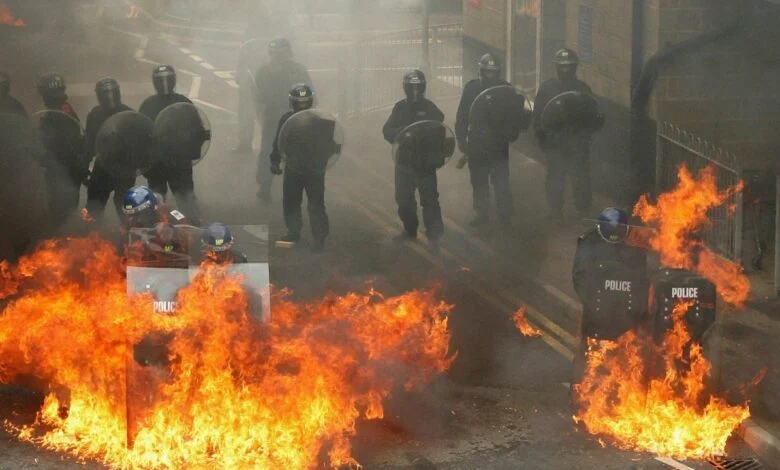Following a wave of violent riots that broke out across major cities, the UK police have announced the arrest of over 1,000 people in one of the largest law enforcement operations in recent memory. The widespread security response that followed the disturbances that started earlier this week also highlighted questions about societal discontent and the efficacy of police tactics.
An Overview of the Riots
August 10, 2024, saw the start of the riots, with disturbances first occurring in a number of significant cities, including Birmingham, Manchester, and London. A nonviolent demonstration against growing living expenses and economic disparity soon descended into widespread violence and destruction of property. Unrest and danger were created by demonstrators fighting with police, looting stores, and setting fire to cars and structures.
Witnesses described situations in which police enforcement and rioters engaged in fierce combat. Numerous locals were forced to flee their houses, public transport was disrupted, and shops were vandalised. Many people have been injured as a result of the violence, while the authorities have not yet disclosed the numbers of the dead.
Police Intervention and Arrests
UK police authorities have taken a number of actions to bring order back in reaction to the increasing violence. In addition to deploying more officers, the Metropolitan Police, Greater Manchester Police, and West Midlands Police have all imposed curfews in the impacted districts. Over a thousand people have been arrested as a result of the raid, on offences ranging from stealing and public disturbance to attacking police officers.
Police Commissioner Sarah Thompson said, “The scale of the violence and the level of disruption have been unprecedented,” underscoring the gravity of the issue. To protect the safety of our communities and to hold those responsible accountable, we are acting decisively.”
A significant inquiry into the riots has also been declared by the authorities, with the goal of identifying the main planners and catalysts of the disturbances. Examining copious CCTV footage, examining social media activity, and speaking with witnesses are all part of the investigation.
Fundamental Reasons
Long-simmering social and economic problems have been brought to light by the riots. Increasing levels of inequality, stagnant earnings, and rising living expenses have all contributed to the growing discontent of a large number of people. Recent findings suggest that low-income people have been severely hit by inflation and housing constraints.
The riots, according to protest organisers and campaigners, are a sign of a generalised outrage at structural shortcomings and the government’s insufficient response to the financial hardships that the average person faces. They contend that the violent outbursts are a last-ditch effort to draw attention to urgent social problems.

Political and Public Responses
Both the general people and government figures have responded in a variety of ways to the rioting and the arrests that followed. Concerns regarding the scope of the violence and its effects on local communities have been voiced by many residents. In the impacted areas, there is a noticeable sense of anxiety and uncertainty, and locals are demanding both short-term safety precautions and long-term solutions to deal with the underlying causes of the disturbance.
Political figures have also offered their opinions on the matter. Elizabeth Grant, the prime minister, has denounced the violence and reaffirmed her commitment to resolving the financial problems that fuelled the unrest. She said, “We have to address the underlying issues that have caused this crisis in addition to our unwavering condemnation of the violence and criminal behaviour. We’re determined to act decisively to raise everyone’s standard of living and economic prospects.”
Leaders of the opposition have demanded a more sophisticated strategy for resolving the underlying causes of the turmoil. They contend that oppressive law enforcement and large-scale arrests might not resolve the underlying issues and might perhaps make things worse. They have pushed the government to hold real conversations with impacted
Effects on the Communities
The impacted communities have been profoundly impacted by the riots. Numerous local businesses have sustained significant damage, and the fallout of the violence is still causing problems for many individuals. Local groups and community leaders are attempting to offer resources and support to individuals in need, such as emergency aid for families who have been uprooted and therapy services for trauma survivors.
Calls for more funding for social services and community development have also been sparked by the devastation. Proponents contend that in order to stop future unrest and create more resilient communities, it is imperative to address concerns like poverty, education, and work prospects.
Potential Futures
Recovery and reconstruction will probably take centre stage while the police work to control the riots’ aftermath. The immediate needs of the impacted areas as well as the longer-term problems brought on by the social and economic problems that sparked the disturbance must be addressed by the federal government and local authorities.
The success of the riot response and the likelihood of significant change will be determined in the upcoming weeks and months. Restoring stability and promoting a more inclusive society would require a well-balanced strategy that takes into account social injustices as well as security concerns.


